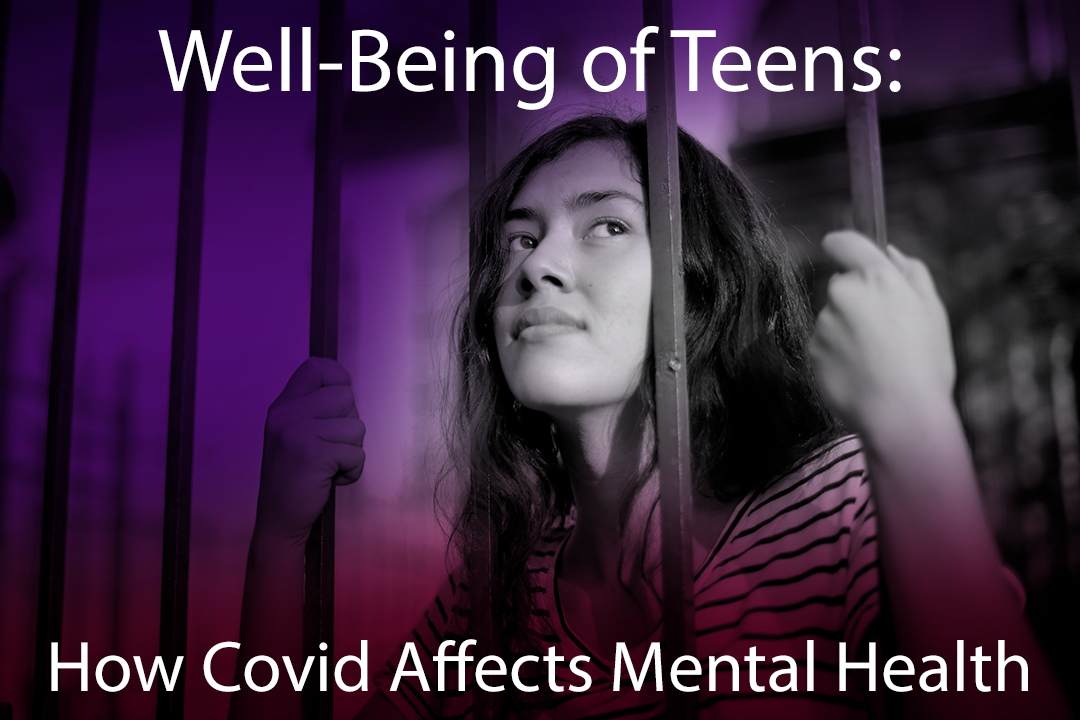
14 Jan Well-Being of Teens: How Covid Affects Mental Health
THE WELL-BEING OF TEENS
The purpose of parenting as we define it in all Active Parenting programs is stated as: To protect and prepare children and teens to survive and thrive in the kind of society in which they will live. The world in which we now live is home to a word that two years ago most of us had never heard, Covid. That word now threatens the ability of our children to survive and thrive. Parents, caregivers, Active Parenting leaders, and others who care about the next generation are being tested like seldom before as we fight for their very well-being. One of the groups hit hardest by this pandemic is our teens. We have talked a lot about how Covid affects our health. Let’s talk about how Covid affects mental health and how that impacts the well-being of teens.
HOW COVID AFFECTS MENTAL HEALTH AND ITS IMPACT ON THE WELL-BEING OF TEENS
Understandably, we have focused on how Covid affects physical health. But many recent articles show how Covid also affects mental health and impacts the well-being of teens. In a recent study* titled “The State of Young People during Covid-19,” researchers found that of the students participating in the study, “more than 1 in 4 young people reported an increase in losing sleep because of worry, feeling unhappy or depressed, feeling constantly under strain, or experiencing a loss of confidence in themselves.”
Loneliness and isolation are difficult for anyone, but for teenagers it can be particularly devastating. The CDC reports that: “Beginning in April 2020, the proportion of children’s mental health-related ED (Emergency Department) visits among all pediatric ED visits increased and remained elevated through October. Compared with 2019, the proportion of mental health-related visits for children aged 5-11 and 12-17 years increased approximately 24% and 31%, respectively.”
WHY PANDEMIC-IMPOSED ISOLATION IS HARDER ON TEENS
Children develop independence from their parents or guardians during their teen years, and peers have an increasingly important role in this. Friends become a part of a larger support network as teens start to navigate the world without their parents. Friends also contribute to a teen’s sense of belonging, one of the foundational goals of humans.
The need to protect our teens from the pandemic has resulted in many teens being isolated from this crucial support system. A study by the Society for Research in Child Development shows that “Close friendship strength in mid-adolescence predicted relative increases in self-worth and decreases in anxiety and depressive symptoms by early adulthood. Affiliation preference by the broader peer group, in contrast, predicted higher social anxiety by early adulthood. Results are interpreted as suggesting that adolescents who prioritize forming close friendships are better situated to manage key social developmental tasks going forward than adolescents who prioritize attaining preference with many others in their peer milieu.”
In other words, strong, healthy friendships have a positive and deep impact on teens and help set the foundation for well-being into adulthood. The relationships teens form with their peers are as important as physical health and doing well in school. For most teens, the lessening of restrictions on social interactions is good news: a chance to get back to building a foundation for well-being.
SOME TEENS SEE ISOLATION AS RELIEF FROM BULLYING
On the other end of the spectrum, teens who had negative experiences with peers before the pandemic tended to see social distancing as a relief. Michael Martinez and Deborah Temkin of “Child Trends” reported: “Recent data from the Cyberbullying Research Center show that, in 2021, 23 percent of 13- to 17-year-old students reported experiencing bullying and 7 percent reported bullying others. These rates represent a significant decrease from 2019, when 51 percent reported experiencing bullying and 12 percent reported bullying others. Additionally, a team of Boston University researchers studying trends in Google search data found that searches for bullying and cyberbullying dropped approximately 30 to 40 percent in Spring 2020—the time of the initial transition to remote learning. However, The New York Times quoted Dr. Cora Breuner, spokeswoman for the American Academy of Pediatrics, as saying that this relief from bullying will be short-term with the more long-term impact being that “Individuation and development of independence is thwarted or slowed way down when they’re sitting at home all day with parents in the next room.” Ideally children and teens can get back to learning in an environment that is safe both physically and mentally. This is where our Active Parenting Leaders make great contributions—helping parents raise children who are friends and not bullies.
WHAT CAN WE DO?
The bottom line: social interaction and the development of healthy relationships lay the foundation for a teen’s sense of well-being that carries forward into adulthood. So as parents and Leaders, we need to consider how Covid affects the mental health of teens in addition to physical health. It is a worthwhile goal for safe social interaction to become part of our daily experience again. In the meantime, as the CDC advises, “Help adolescents stay socially connected: Encourage adolescents to reach out to friends and family via phone, video chats, social media, or even via video games. Schools may have tips and guidelines to help support their social and emotional needs.” And don’t forget to monitor your child’s overall health—mental and physical.
Active Parenting Leaders: want to provide your parents with some tools and tips? Parents: want to know the signs of distress in children and teens? Here’s a list from the National Alliance on Mental Illness: “What to Look For and When to Act.” For more resources see list below.
*Note: The Center for Promise at America’s Promise Alliance conducted a national survey of 3,300 young people aged 13-19.
Resources:
COVID-19 Parental Resources Kit – Adolescence Social, Emotional, and Mental Well-being of Adolescents during COVID-19
“What to Look For and When to Act” National Alliance on Mental Illness
CDC resources for Families & Children
“Staying at Home During COVID-19: How to Help Teens Cope” Johns Hopkins Medicine
The COVID-19 Pandemic Disrupted Both School Bullying and Cyberbullying • Andrew Bacher-Hicks, Joshua Goodman, Jennifer Greif Green, Melissa K. Holt – Boston University
Related Articles:
New York Times Article: “Teens in Covid Isolation: ‘I Felt Like I Was Suffocating’” cited a recent study on: “The State of Young People during Covid-19”
“TEENS, ISOLATION AND COVID” by Ann Manser • The University of Delaware
“Close Friendship Strength and Broader Peer Group Desirability as Differential Predictors of Adult Mental Health” Empirical Article by Rachel K. Narr, Joseph P. Allen, Joseph S. Tan, Emily L. Loeb
“Pre-Pandemic Peer Relations Predict Adolescents’ Internalizing Response to Covid-19” Fanny Mlawer, Christina C. Moore, Julie A. Hubbard & Zachary M. Meehan Research on Child and Adolescent Psychopathology
“Does going back to school mean going back to bullying?” Johns Hopkins Medicine
Bullying During the COVID-19 Pandemic • Cyberbullying Research Center
Contributing author: Gabrielle Tingley
Active Parenting Publishers founder and president Michael H. Popkin, Ph.D. has been providing research-based education programs with an emphasis on nonviolent discipline, mutual respect, and open communication for over 35 years. He is widely known for his expertise in the field of parent education and has appeared on over 100 TV programs, including CNN and The Oprah Winfrey Show.

 Active Parenting Publishers founder and president
Active Parenting Publishers founder and president